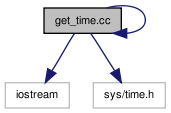get_time.cc File Reference
Implementation of get_time(), a simple way to get the current time since boot in milliseconds. More...
#include "get_time.h"#include <iostream>#include <sys/time.h>
Include dependency graph for get_time.cc:

This graph shows which files directly or indirectly include this file:

Go to the source code of this file.
Namespaces | |
| namespace | project_get_time |
If we're running locally, these will let users in "project" space control time for simulation. | |
Functions | |
| unsigned int | project_get_time::default_get_time_callback () |
| provides default implementation of get_time_callback -- starts a TimeET instance on the first call and then returns its age thereafter | |
Variables | |
| unsigned int | project_get_time::simulation_time = -1U |
| This will default to -1, which signals get_time() to use get_time_callback. Any other value will cause that value to be used instead. | |
| unsigned int(* | project_get_time::get_time_callback )() = &default_get_time_callback |
| This by default will return the time in milliseconds since the first call was made. Note this is a function pointer, so you can reassign it to your own implementation! | |
| float(* | project_get_time::get_timeScale_callback )() = NULL |
| You can reassign this to your own implementation if you might play games with time control. For instance, the simulator can assign a function which simply returns SharedGlobals::timeScale. By default this is NULL, which indicates to getTimeScale that it should use the default implementation. Note that this is a slightly different usage paradigm than get_time_callback(), which is assumed to always be non-NULL (at least, unless you assign a value to simulation_time...). | |
Detailed Description
Implementation of get_time(), a simple way to get the current time since boot in milliseconds.
Definition in file get_time.cc.